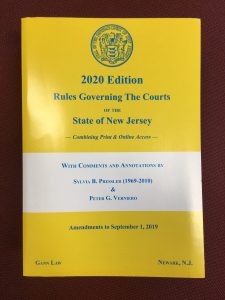On June 8th, I argued a case of significant importance in the Appellant Division. Although I have not received a decision as of yet, I am still of the belief I was heard. The case involved an application from the supporting spouse to terminate alimony based on the cohabitation of his former spouse. Although I did not represent my client at the trial level I believe that my predecessor made the necessary arguments allowing me to present the important issues to the higher court. The Trial Judge had misread the recently decided, Landau decision, believing that the fact in Landau created a litmus test as to what constituted a Prima Facia case allowing discovery and a plenary hearing as to the issue of cohabitation. In fact, Landau provides that before one is entitled to discovery and a plenary hearing one must establish a prima facia case.
A prima facia case is one where the court is to consider the issues presented by the proponent of a proposition in the light most favorable to said, petitioner. In considering the assertions of the petitioner the defenses offered by the opposition are not to be given weight. Since the opposition is not required to give evidence, their election to give selected evidence is should not be considered as the issue is not ultimately a success on the merits but rather the sufficiency of the assertion to justify a full examination of the issue.
The idea of a prima facia case as an entry ticket is based on the privacy right of the dependent spouse who ought not to be forced to divulge intimate details absent the presentation of more than innuendo. In my case, there was significant proof including a private investigator’s report, statements by the paramour of the closeness of the relationship, and some economic proof. The initial problem was that the Trial Court had misread the law, this error of the law was compounded by the trial courts weighing the defenses of the dependent’s former spouse and finding her explanations more credible.
 New Jersey Divorce and Family Lawyer Blog
New Jersey Divorce and Family Lawyer Blog








